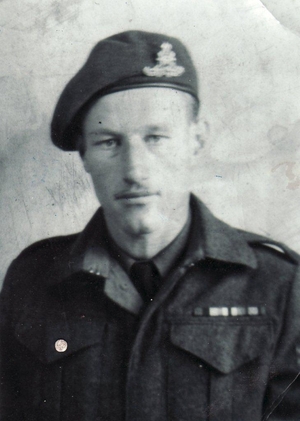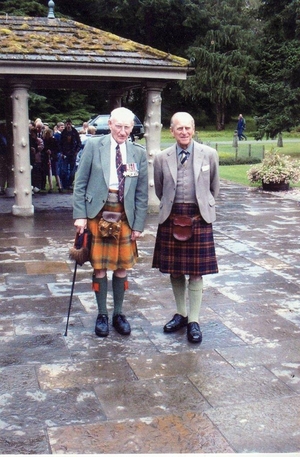
Okill Stuart was with the 14th Canadian Field Regiment, Royal Canadian Artillery, at a command post a few miles into Germany 70 years ago, when the war ended. The regiment had just swept through Holland and was on its way to Berlin when it was told to cease fire. ‘We were expecting the end, then we got the news the war was over,” recalls Stuart, “The Americans were the army of occupation, we weren’t. They pulled the Canadians out the next day and hauled us to Utrecht. There was no way we could all get back to Canada at once, so while we were waiting in Utrecht, we found a yacht club where the Germans had been relaxing a few weeks earlier, picked up cigarettes and bully beef, and we went sailing to celebrate war’s end. With a bit of bribery, we never ate better in our lives.”
Stuart, 94, is among those Veterans who are being honoured in Leeuwarden, Holland, to mark this year’s anniversary. He has returned many times over the past seven decades. He recalls fondly making the trip several years ago and when he went to present his passport to customs, was waved through. “We didn’t ask for a passport when you came here to liberate us in 45, so I’m not going to ask you show your passport now,” a customs official told him.
Stuart was 23 years old when he stormed the beaches of Normandy on D-Day. In spite of, or perhaps because of the horror he experienced in war, Stuart has filled his own life and the lives of others with a zest for living and learning.
“Being a subordinate, and barely out of my teens at the time, I knew little other than my own particular job, plotting guns and targets with a self propelled field artillery regiment,” he wrote of the D-Day experience in a family memoir. “As we assaulted the beaches, we were given the task of firing a barrage in front of the infantry, a somewhat tricky operation from a craft bobbing up and down in the rough seas...as well, we had to contend with strafing from a few low–flying German aircraft. The beach was just plain hell, with a host of dead and dying together, with a multitude of enemy prisoners under the sea wall. As soon as darkness fell, German planes flew over and searchlights came up on the beach. Tracer bullets from ack-ack guns lit up the sky, followed by the ammunition dumps exploding – a better fireworks show than any 1st of July.” When the war began in 1939, Stuart was preparing to attend Oxford University. Through the generosity of a rich uncle, Sir Campbell Staurt, Okill had attended Bishop’s college school in Quebec a
In a speech he delivered in Holland on the 65th anniversary of the D-Day landing, Stuart recalled that the Germans were not the only threat that allied ground troops had to fear.nd then went to Gordonstoun where one of his classmates was H.R.H. The Prince Phillip.

“All we had in common was the fact that we both had rich uncles,” says Stuart, who carried on a life-long correspondence with the Queen’s husband. When war was declared, Stuart enlisted in the Royal Canadian Artillery and served as bombardier. He is alive today because he disobeyed orders when his landing craft approached the Normandy shore. In his book, Juno Beach, author Mark Zuehlke, suggests that as they neared the coastline “a few German shells exploded nearby in the water. Stuart realized that if a piece of shrapnel struck a mine they would have been blown sky high… he didn’t need to do any mathematical calculations to determine that they would all die disastrously if the mines were still aboard when they made the final run up to the beach into the face of enemy fire. Without seeking clearance from the regiment’s commander, the men aboard Stuart’s landing craft cut the mines free and dumped them over the gunwhale.”
“About five weeks after the invasion of Holland, a major attack was about to get underway. The U.S. Air Force was going to soften things up by bombing the German front lines,” he recalled. “But their bombs landed close to our infantry division as well as the Polish Division. The next day, the British in Lancaster and Liberator bombers came. They were even less accurate than the Americans. In fact, they knocked out most of our wagon lines which were located to the rear of the gun positions. This resulted in some slight disarray in our ranks,” he dead panned.
“Every man who has ever felt the sting of steel will remember the name of the game – kill or be killed."

























Commentaires
Veuillez vous connecter pour poster des commentaires.